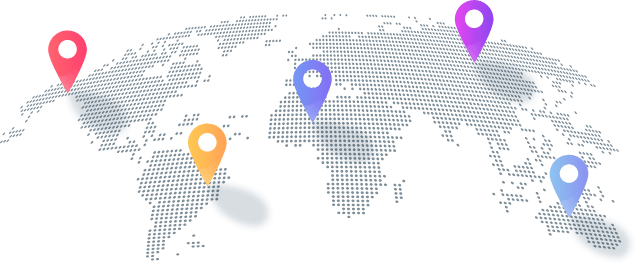
The Evolution of the World Wide Web
Posts
The World Wide Web has advanced significantly since its inception in 1991. Sir Tim Berners-Lee initially created it as a simple method for academics to exchange knowledge. Over time, it expanded into a worldwide platform, transforming how we interact, collaborate, and live. Let us look at its major turning points from 1991 to 2023:
Birth of the Web (1991-1995)
Tim Berners-Lee introduced the web at CERN in 1991. It started as a text-based platform, navigated through hyperlinks and HTTP. By 1993, web browsers like Mosaic made it accessible to a broader audience.
Dot-com Bubble (1995-2000)
The dot-com bubble influenced the commercial boom in the middle of the 1990s. Many businesses flocked online but experienced failure. Nevertheless, it set the stage for online shopping and the internet-based economy.
Rise of Social Media and Web 2.0 (2001-2009)
Social media platforms like Facebook, MySpace, and Friendster have enabled people to connect worldwide. The Web 2.0 improved user experiences by introducing user-generated content.
Mobile Revolution and Apps (2010-2015)
Smartphones and mobile Internet drove a shift to mobile-centric experiences. App ecosystems, led by Apple and Google, changed how we accessed content and services.
Age of Streaming and On-Demand Content (2016-2020)
Streaming services like Netflix and YouTube gained popularity, offering on-demand content. Faster internet speeds and improved infrastructure supported this growth.
Internet of Things (IoT) and Smart Devices (2021-2023)
IoT integration soared, connecting smart devices to the web. Voice-activated virtual assistants, like Alexa and Google Assistant, further exemplified IoT’s significance.
The web’s evolution continues, with advancements in AI, VR, and web accessibility on the horizon. The future promises exciting developments that will shape our digital landscape even further.
Trends and Insights for the World Wide Web Beyond 2023
The following are a few key W3 trends to look forward to in 2023 and beyond:
The Internet of Things (IoT) Integration
The Internet of Things, a concept that enables communication and data collection between common objects, significantly impacts W3 evolution. It is predicted that the number of connected wearables, commercial machines, and smart home appliances will exponentially increase by 2023. IoT integration is set to facilitate a fully integrated society while also making our daily lives simpler, more effective, and more automated.
The IoT is transforming how we interact with technology and the Internet. We create a large network of interconnected systems by connecting countless products and gadgets to the Internet, such as smartwatches and industrial machines. These devices require little assistance from humans and are able to communicate with one another, collect data in real-time, and respond to changing conditions.
Artificial Intelligence (AI) and Machine Learning
The integration of artificial intelligence (AI) and machine learning (ML) into the World Wide Web is transforming many businesses. AI and ML are enabling businesses to automate tasks, improve decision-making, and personalize experiences for their customers. Virtual assistants and chatbots driven by AI will advance in sophistication, offering seamless customer support and individualized experiences.
As AI algorithms improve data analysis, organizations can make better decisions based on the knowledge gained from massive amounts of data. Ethics and regulations will be increasingly important as AI develops to address potential issues and ensure responsible AI applications.
Web 3.0: The Decentralized Web
The idea behind “Web 3.0” is a decentralized internet where users have more control over their data and online experiences. We may anticipate more development in the creation of decentralized platforms driven by blockchain technology in 2023.
These platforms will challenge the hegemony of centralized tech corporations by enhancing security, privacy, and data ownership. Decentralized finance (DeFi) and non-fungible tokens (NFTs) will redefine digital economies and alter online transactions.
5G and Beyond: Faster and Ubiquitous Connectivity
5G is here to impact the World Wide Web in 2023, which promises faster speeds, lower latency, and larger capacity. 5G provides 100 times faster speed than that of 4G, allowing for lightning-fast downloads, real-time communication, and smooth streaming.
This will make online interactions more fruitful and enjoyable, improving the overall user experience. 5G is, therefore, a tremendous advance over 4G and will have a big impact on the Internet by 2023 and beyond, considering the above factors.
Augmented Reality and Virtual Reality
The World Wide Web will continue to be profoundly impacted by the advancements in AR and VR technologies. AR and VR will change how we consume material and communicate online, from immersive online retail experiences to virtual meetings and educational applications. The use of AR and VR applications is predicted to increase in 2023, expanding the potential of the web.
Continued Focus on Web Accessibility
Web accessibility for all continues to be a primary issue as the Internet grows more and more integrated into our daily lives. The development of accessible web experiences for those with disabilities will receive more attention in 2023. Businesses will understand the need to reach a wider audience by offering accessible information and services, and developers will follow accessible design best practices.
Source: onpassive.com
Need Fast & Secure Broadband? Use Arif Home Fibre .
Frequently Asked Questions
You must be living in an area within our network coverage. To check our coverage please call/text/WhatsApp 0769669252
You will be connected within 48hrs of payment and upon confirmation of your availability for connection.
You can pay for the service through Mpesa Paybill No. and your account number. (The account number will be provided to you upon purchase of the service).
To upgrade or downgrade your service, kindly contact us on +254 769669252
When moving to another location, you are advised to take the router with you then call +254769669252
Green:means the internet is fine. Red light means your internet has lost its signal. Call the office to request a technician to check it out
We are everywhere
Home Internet customers that did not provide an email address for service notifications
